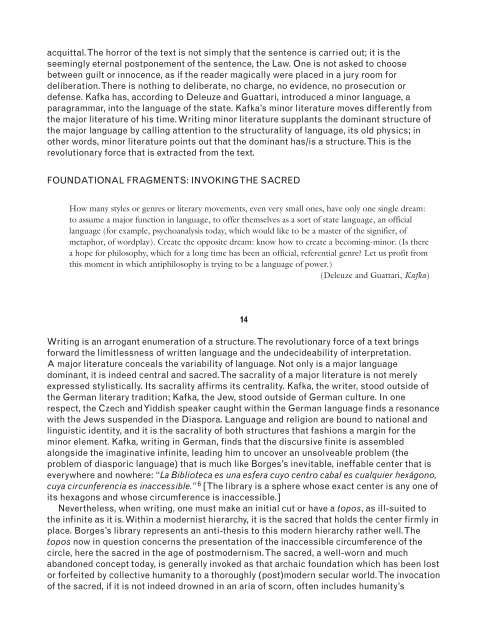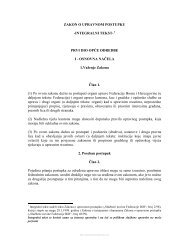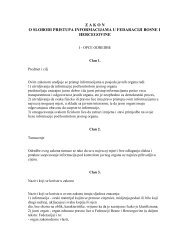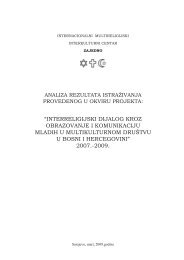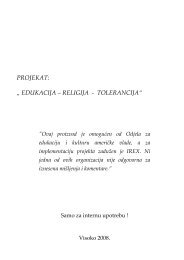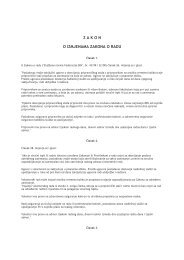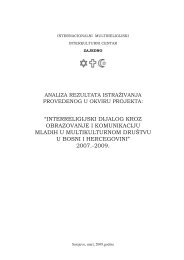y relativity <strong>and</strong> quantum theory, modern <strong>and</strong> postmodern art, theory <strong>and</strong> criticism, <strong>and</strong> departuresfrom conventional metaphysics. 4This emphasis on intertextuality <strong>and</strong> the ambiguity of language aids in clarifying theepigraphs from Deleuze <strong>and</strong> Guattari, <strong>and</strong> Borges. Reading (or writing) a text is not merely acognitive act, nor is it simply exegetical; it is a multi-textual activity or a schizoid exercise thatextracts from the text its “revolutionary force.” Where Deleuze <strong>and</strong> Guattari see thepersistence of the heterogrammatical structurality of language as revolutionary, their criticssee a ludic enterprise. A schizoid exercise is ludic, however, only if one holds an undyingbelief in lucidity, a one-to-one correspondence between language <strong>and</strong> world.<strong>Postmodern</strong> inquiry, with its intertextual dependency, calls attention to this well-hiddenepistemological naïveté of the lucid ideologies that deform semiosis. Within a naïve realismor realist epistemology, language <strong>and</strong> world unproblematically come together in textuality.Clarity <strong>and</strong> political/ideological action derive from this metaphysics of materiality, i.e. the/areal world. For Deleuze <strong>and</strong> Guattari, this is the commonplace scholarly search (appliedtheory) for the signified that (over)determines the text <strong>and</strong> yields meaningfulness. For theirpart, Deleuze <strong>and</strong> Guattari have complicated the revolutionary character of texts. They offer arevolution of desire as opposed to the widely used sleight-of-h<strong>and</strong> in which materiality findsitself conjoined with any available political enterprise purporting to be revolutionary.In Kafka: Toward a Minor Literature, Deleuze <strong>and</strong> Guattari do not view the writer, in thiscase Franz Kafka, as “a writer-man” [un homme écrivain]; instead, Kafka is “a machine-man”[un homme machine] <strong>and</strong> “an experimental-man” [un homme expérimental] who falls intolanguage in between the symbolic <strong>and</strong> the phantasmagoric. In this sense, the revolutionaryforce of Kafka’s text is its becoming, becoming-animal [devenir-animal], becoming-inhuman[devenir-inhuman]:13We won’t try to find archetypes that would represent Kafka’s imaginary, his dynamic, or hisbestiary (the archetype works by assimilation, homogenization, <strong>and</strong> thematics, whereas ourmethod works only where a rupturing <strong>and</strong> heterogeneous line appears) [l’archétype procéde parassimilation, homogénéisation, thématique, alors que nous ne triuvons notre régle que lorsque seglisse une petite ligne hététrogéne, en rupture]. Moreover, we aren’t looking for any so-called freeassociations (we are all well aware of the sad fate of these associations that always bring us backto childhood memories [souvenir d’enfance] or, even worse, to the phantasm, not because theyfail to work but because such a fate is their actual underlying principle). We aren’t even tryingto interpret, to say that this means that. And we are looking least of all for a structure of formaloppositions <strong>and</strong> a fully constructed Signifier [du signifiant tout fait]; one can always come upwith binary oppositions like “bent head–straightened head” or “portrait–sonority” <strong>and</strong> biunivocalrelations like “bent head–portrait” or “straightened head–sonority.” But that is stupidas long as one doesn’t see where the system is coming from <strong>and</strong> going to, how it becomes, <strong>and</strong>what element is going to play the role of heterogeneity [le rôle d’hétérogénéité], a saturatingbody that makes the whole assembly flow away <strong>and</strong> that breaks the symbolic structure, no lessthan it breaks hermeneutic interpretation, the ordinary association of ideas [l’association d’idéeslaïque], <strong>and</strong> the imaginary archetype. 5Deleuze <strong>and</strong> Guattari’s machine, minor literature, much like Merrell’s new physics, representsa deterritorialization of language. Kafka’s K. in The Trial, for example, does not receive an
acquittal. The horror of the text is not simply that the sentence is carried out; it is theseemingly eternal postponement of the sentence, the Law. One is not asked to choosebetween guilt or innocence, as if the reader magically were placed in a jury room fordeliberation. There is nothing to deliberate, no charge, no evidence, no prosecution ordefense. Kafka has, according to Deleuze <strong>and</strong> Guattari, introduced a minor language, aparagrammar, into the language of the state. Kafka’s minor literature moves differently fromthe major literature of his time. Writing minor literature supplants the dominant structure ofthe major language by calling attention to the structurality of language, its old physics; inother words, minor literature points out that the dominant has/is a structure. This is therevolutionary force that is extracted from the text.FOUNDATIONAL FRAGMENTS: INVOKING THE SACREDHow many styles or genres or literary movements, even very small ones, have only one single dream:to assume a major function in language, to offer themselves as a sort of state language, an officiallanguage (for example, psychoanalysis today, which would like to be a master of the signifier, ofmetaphor, of wordplay). Create the opposite dream: know how to create a becoming-minor. (Is therea hope for philosophy, which for a long time has been an official, referential genre? Let us profit fromthis moment in which antiphilosophy is trying to be a language of power.)(Deleuze <strong>and</strong> Guattari, Kafka)14Writing is an arrogant enumeration of a structure. The revolutionary force of a text bringsforward the limitlessness of written language <strong>and</strong> the undecideability of interpretation.A major literature conceals the variability of language. Not only is a major languagedominant, it is indeed central <strong>and</strong> sacred. The sacrality of a major literature is not merelyexpressed stylistically. Its sacrality affirms its centrality. Kafka, the writer, stood outside ofthe German literary tradition; Kafka, the Jew, stood outside of German culture. In onerespect, the Czech <strong>and</strong> Yiddish speaker caught within the German language finds a resonancewith the Jews suspended in the Diaspora. Language <strong>and</strong> religion are bound to national <strong>and</strong>linguistic identity, <strong>and</strong> it is the sacrality of both structures that fashions a margin for theminor element. Kafka, writing in German, finds that the discursive finite is assembledalongside the imaginative infinite, leading him to uncover an unsolveable problem (theproblem of diasporic language) that is much like Borges’s inevitable, ineffable center that iseverywhere <strong>and</strong> nowhere: “La Biblioteca es una esfera cuyo centro cabal es cualquier hexágono,cuya circunferencia es inaccessible.” 6 [The library is a sphere whose exact center is any one ofits hexagons <strong>and</strong> whose circumference is inaccessible.]Nevertheless, when writing, one must make an initial cut or have a topos, as ill-suited tothe infinite as it is. Within a modernist hierarchy, it is the sacred that holds the center firmly inplace. Borges’s library represents an anti-thesis to this modern hierarchy rather well. Thetopos now in question concerns the presentation of the inaccessible circumference of thecircle, here the sacred in the age of postmodernism. The sacred, a well-worn <strong>and</strong> muchab<strong>and</strong>oned concept today, is generally invoked as that archaic foundation which has been lostor forfeited by collective humanity to a thoroughly (post)modern secular world. The invocationof the sacred, if it is not indeed drowned in an aria of scorn, often includes humanity’s
- Page 2: PARA/INQUIRY“For those of us who
- Page 5 and 6: First published 2000by Routledge11
- Page 8 and 9: CONTENTSList of figures ixAcknowled
- Page 10: FIGURES3.1 Questioner of the Sphinx
- Page 14: Posting
- Page 17 and 18: meaning that founds philosophical i
- Page 20: CHAPTER 1Paralogies
- Page 23 and 24: Lyotard’s enjeu, Deleuze and Guat
- Page 25: In his book Pararealities: The Natu
- Page 29 and 30: writer therefore work without rules
- Page 32: CHAPTER 2Parastructures of the sacr
- Page 35 and 36: In this critical space opened by Ni
- Page 37 and 38: Joyce’s Finnegans Wake the exempl
- Page 39 and 40: Deservedly confin’d into this roc
- Page 41 and 42: story of the sacred? Is there but o
- Page 44 and 45: The aspects of things that are most
- Page 46 and 47: AUTHENTICITYThe Sphinx has symboliz
- Page 48 and 49: The fact that I exist and have an i
- Page 50 and 51: connection with the Columbian Expos
- Page 52 and 53: through the sacred, so does the com
- Page 54 and 55: appropriation of his thought and of
- Page 56 and 57: use or civil meaning of the word (t
- Page 58 and 59: does not mean that one is sidestepp
- Page 60: of the twentieth century. As Lyotar
- Page 64 and 65: The sacred of the archaic world was
- Page 66 and 67: possibility for an expression of ex
- Page 68 and 69: the actual frame of the panels, the
- Page 70 and 71: space of the painting, and, second,
- Page 72 and 73: much a part of scholarship today. A
- Page 74 and 75: not merely interesting footnotes to
- Page 76 and 77:
many to see Eliade as a mystic who
- Page 78 and 79:
phenomenology. Eliade’s arrival i
- Page 80 and 81:
of the sacred as a child in Romania
- Page 82 and 83:
discursive structure to relinquish
- Page 84 and 85:
autonomy of the work of art. But ha
- Page 86:
CHAPTER 5Para Shoah
- Page 89 and 90:
Faurisson reveals that the Shoah is
- Page 91 and 92:
MEMORIES OF FORGETTINGCertainty is
- Page 93 and 94:
political. Each of these ground(ing
- Page 95 and 96:
totalizing discourses or a determin
- Page 97 and 98:
Kantian wound often move toward a q
- Page 99 and 100:
Secret fauna and flora which the re
- Page 102:
CHAPTER 6Parasacred ground(ing)s
- Page 105 and 106:
often exist outside (the pagus) the
- Page 107 and 108:
graveyard. The sacred disfigures,be
- Page 109 and 110:
death, which is another repetition
- Page 111 and 112:
able to choose from a range of poss
- Page 113 and 114:
eligious. Mary’s presence as a mi
- Page 115 and 116:
As one walks through a cemetery, ti
- Page 117 and 118:
104Figure 6.15b Clinging to the Cro
- Page 120 and 121:
To think not is to linger with a ne
- Page 122 and 123:
PARASACRED IMAGESNor does one need
- Page 124 and 125:
irreverent piety in so far as eachr
- Page 126:
CHAPTER 8EpilogueParaultimacy
- Page 129 and 130:
The steps, the corridor, to the plo
- Page 131 and 132:
GLOSSARYI should say that in so far
- Page 133 and 134:
The early writings of the French ph
- Page 135 and 136:
NOTESPOSTING1 Michel Montaigne, Apo
- Page 137 and 138:
metaphysical notion of effectivespa
- Page 139 and 140:
and probably goes back to helios.Ea
- Page 141 and 142:
“compensate” the rigidity of th
- Page 143 and 144:
GLOSSARY1 Peter A. Angeles writes(H
- Page 145 and 146:
Stanford: Stanford University Press
- Page 147 and 148:
Riverside Shakespeare edn, Boston:H
- Page 149 and 150:
Carroll, Lewis 23cemeteries 93, 101
- Page 151 and 152:
painting 58; laughter as epiphany 5
- Page 153 and 154:
“paraexperience” 83, 86; the po
- Page 155 and 156:
postmodernism: authenticity 33;ceme
- Page 157 and 158:
Thousand Plateaus, A (Gilles Deleuz


